Going back to the initial weeks of 2020, prior to the Western world’s first lockdown in Lombardy, Italy, on February 21, it’s remarkable how normal things were. COVID had appeared in headlines, but to the extent people were discussing it—even those who would later spend years demanding harsh restrictions and mandates—they were generally doing so in rational and reassuring terms.
The Atlantic, for example, published an excellent piece titled You’re Likely to Get the Coronavirus. Harvard epidemiologist Marc Lipsitch predicted that by the end of the year, some 40 to 70 percent of people would be infected with the virus. And that was okay. Just Mother Nature doing its thing.
There was, of course, the surreal news that General Secretary Xi Jinping had just imposed the most draconian lockdown in human history in Wuhan, China. But even the conversation about that historical anomaly was as normal as one could expect. Most commentators opined on how brutal and illiberal the lockdown seemed. Many expressed fears about how dangerous China’s response made the virus appear. Some, especially those connected to China, reacted hopefully about China’s response.
But one thing virtually no one in the world was doing prior to the lockdown of Lombardy was looking at the lockdown of Wuhan and hoping the rest of the world would come to adopt that policy. And for good reason. Lockdowns had no precedent in the modern Western world and weren’t part of any democratic country’s pandemic plan. For its part, the World Health Organization didn’t endorse China’s lockdown policy as precedent until February 24, 2020, three days after the lockdown of Lombardy.
The number of individuals in the world who publicly advocated or hoped for the international adoption of China’s lockdown policy prior to the lockdown of Lombardy is so small, in fact, that you might literally be able to count it on one hand. To those who’ve studied the response to COVID, some of the names may come as no surprise. Physicist Yaneer Bar-Yam and his colleague Nassim Taleb had long worked on the bizarre “science” of mass quarantine, and looked gleefully at the Wuhan experiment as something the rest of the world might come to emulate. Physicist Neil Ferguson, architect of the wildly-inaccurate COVID models that sent the world into a tailspin, was already working on global social distancing policies, though it’s not clear if he’d yet advocated for emulating China.
Yet among this extremely tiny group who looked positively on the prospect of global adoption of China’s lockdown policy before the lockdown of Lombardy, one person stands out in particular: Balaji Srinivasan, a venture capitalist and tech mogul who couldn’t tweet enough about all the details of the “new normal” that the world would soon see by the end of the year.
Balaji first began tweeting about the new coronavirus on January 30, 2020. For reference, this is the same day that an anonymous stock tip was posted by someone who said they had “friends and family in the medical industry and field, including at CDC and one close friend at WHO,” and that the WHO was already privately planning to begin recreating China’s response across the Western world, first by locking down Italian cities:
There are very high profile investors who’ve been silently pulling out ahead of time… the WHO is already talking about how “problematic” modeling the Chinese response in Western countries is going to be, and the first country they want to try it out in is Italy. If it begins a large outbreak in a major Italian city they want to work through the Italian authorities and world health organizations to begin locking down Italian cities in a vain attempt to slow down the spread at least until they can develop and distribute vaccines, which btw is where you need to start investing… I just think it’s a really shitty thing to not be sharing this information with the public because they arrogantly think we’re all irrational and shouldn’t be informed as they are.
That same day, Balaji began his tweet campaign. Balaji presented himself as a kind of eccentric financial savant who was terrified of the new virus and had pieced together an earthshaking story that was being downplayed by the media. Balaji’s first tweets on the subject came in the form of a detailed and widely-shared thread about all the changes the world would soon see if this turned out to be “the pandemic that public health people have been warning about for years.”
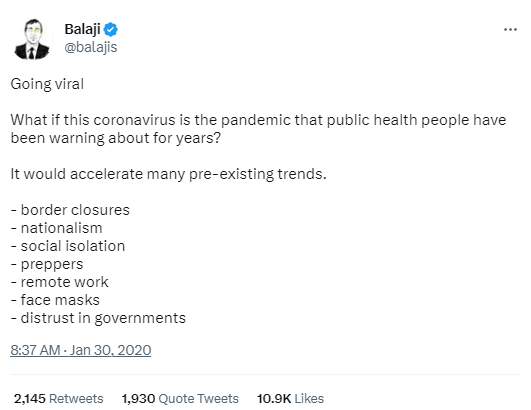

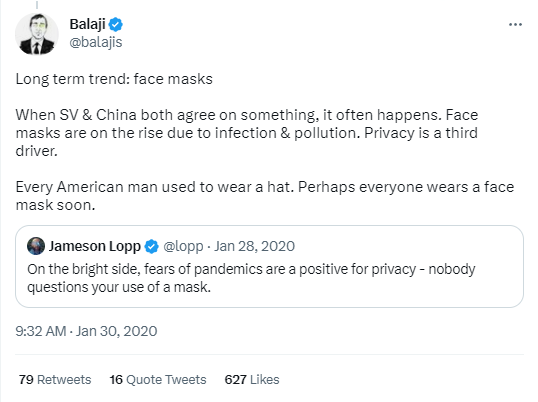





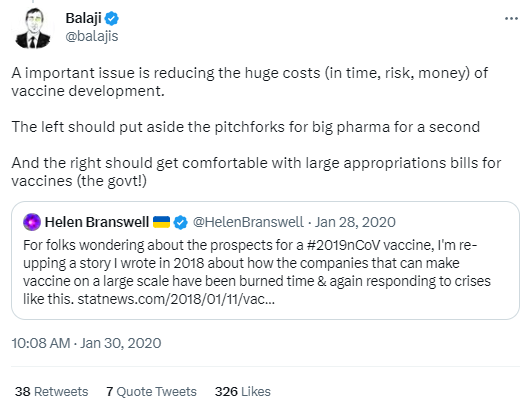

Like the anonymous stock tip posted that same day, an unbelievable number of Balaji’s seemingly-wild “predictions” turned out to be near-perfect prognoses. Though they’d been ruled out by existing public health literature across the Western world, everyone did soon begin wearing face masks following a sharp, unscientific reversal by the public health establishment in April 2020. With the entire world following China’s containment model, remote work did soon take over the world. And, governments across the world did sharply reduce the approval time for vaccine development.
Days later, Balaji posted another thread in which he observed that the Wuhan lockdown would precipitate a flip into digital life, in which the population moved “away from handshakes, restaurants, and public gatherings” into a new form of “remote life.” He also “predicted” that the rest of the world would soon follow.


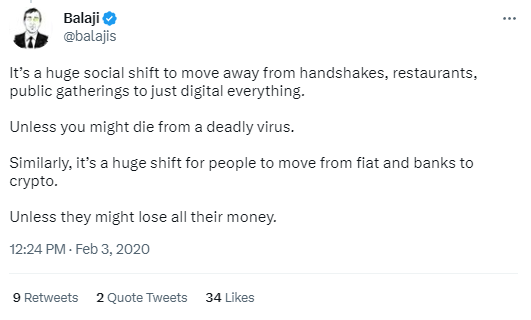

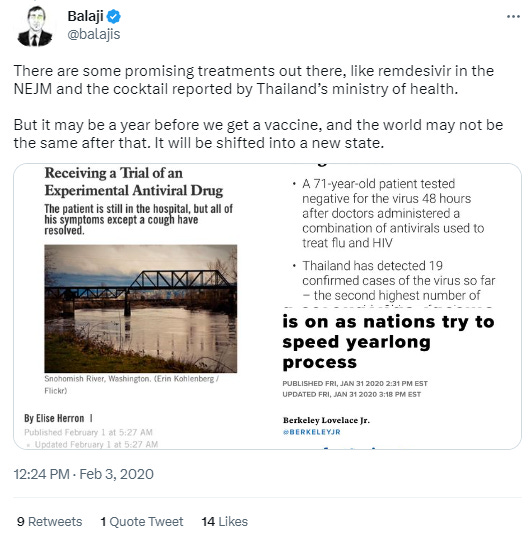

Balaji’s language about moving away from “handshakes” mirrored that which would soon come from leading public health officials including Anthony Fauci, who two months later suggested that Americans should never shake hands again due to COVID. And, just as Balaji wrote, it did take a year for a vaccine to arrive, by which time the entire world had indeed followed China’s containment model into a “new state” of “remote life.”
This idea that COVID would soon lead the world into a “new normal” is one that Balaji repeated several times.
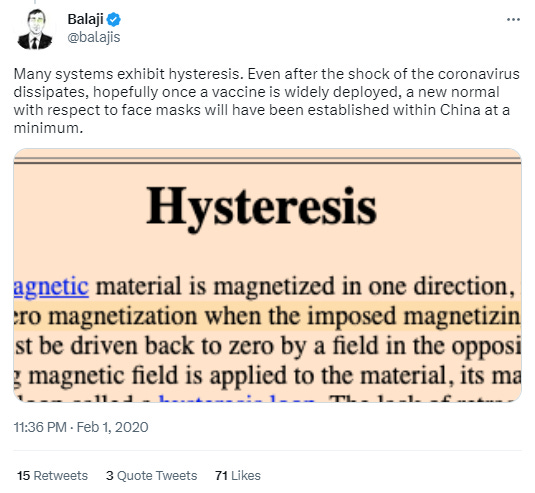

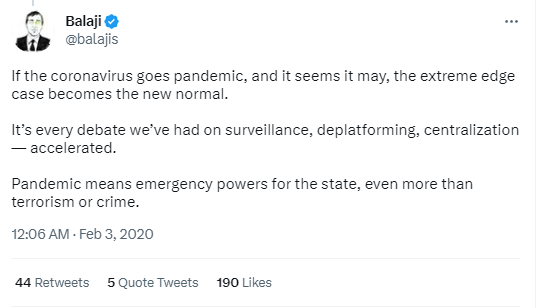

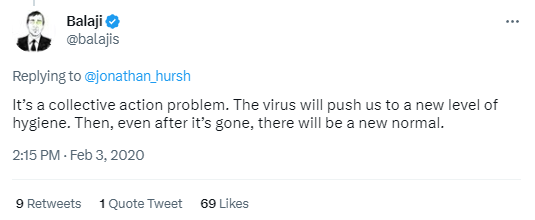

Like his messaging about moving away from “handshakes,” Balaji’s exact term, the “new normal,” would soon be used by leading pro-lockdown officials all over the world—such as by vocal “Zero Covid” advocate Walter Ricciardi, liaison between the WHO and the Ministry of Health in Italy.
Balaji was especially excited about all the new technologies he saw being deployed during China’s lockdowns, owing to their “wartime levels of medical innovation.”


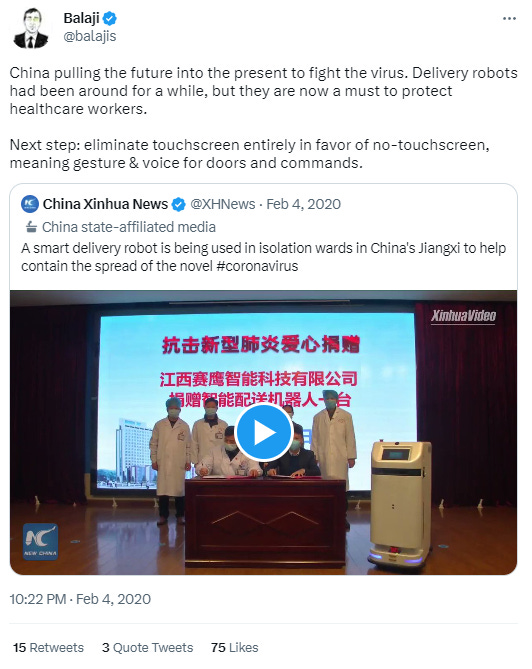



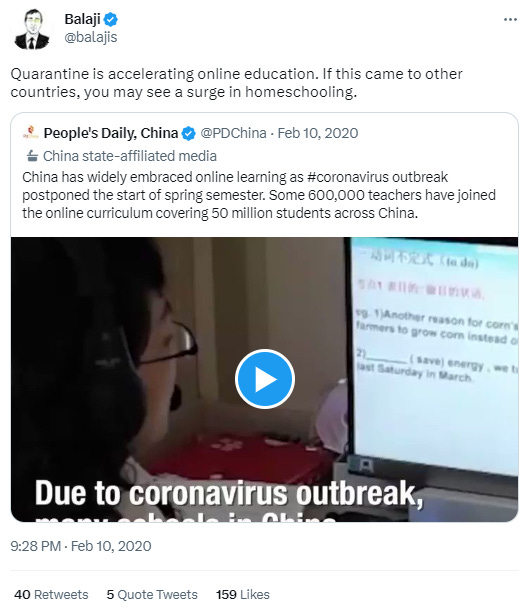

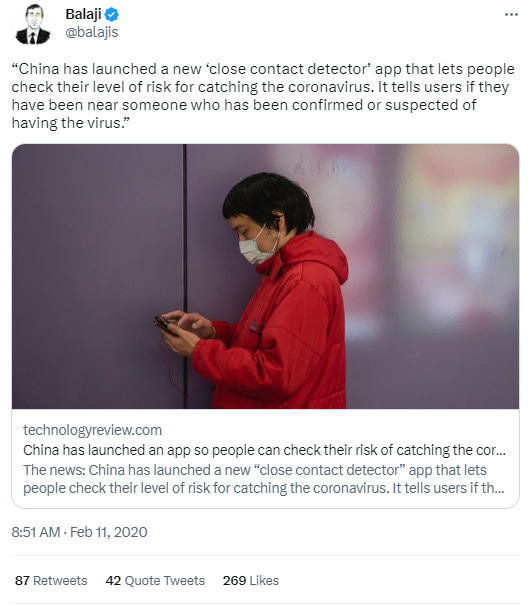

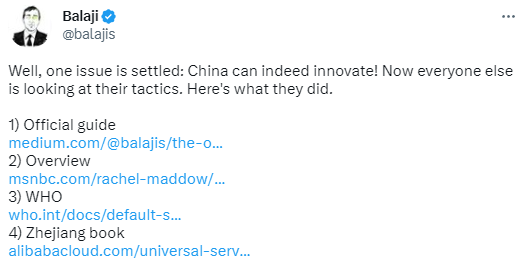

After the WHO issued its February 2020 report endorsing the global adoption of China’s “uncompromising and rigorous use of nonpharmaceutical measures to contain transmission of the COVID-19 virus,” New York Times reporter Donald McNeil wrote an article promoting the WHO’s report titled “To Take On the Coronavirus, Go Medieval on It,” admiring how “China is a place where a leader can ask himself, ‘What would Mao do?’ and just do it.” At the time, many commentators found the idea of copying China’s lockdown policy so ridiculous that they thought McNeil’s article had to be satire. Balaji, on the other hand, cited McNeil’s article positively as part of a thread about how St. Louis had supposedly saved many lives by canceling parades and other events during the Spanish flu, a kind of propaganda story that was shared widely as part of the initial justification for lockdowns.
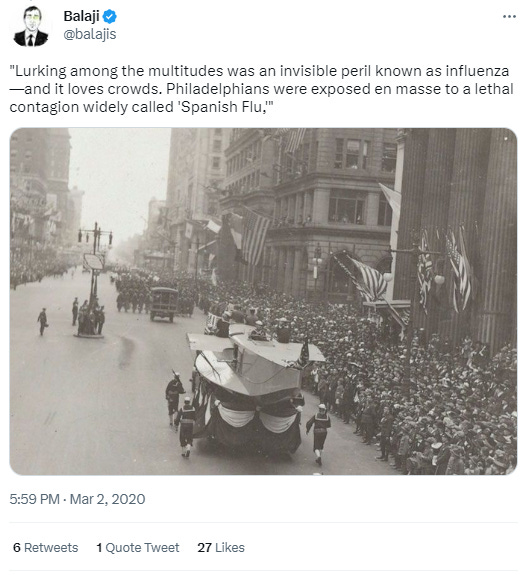

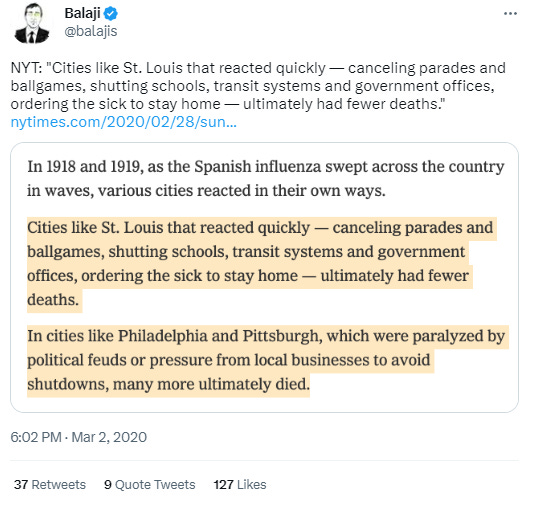

Balaji later cited one of McNeil’s interviews for the proposition that “we should know *exactly* what the Chinese did, and determine which of those features are compatible with our ethics and which are not, and then execute.”
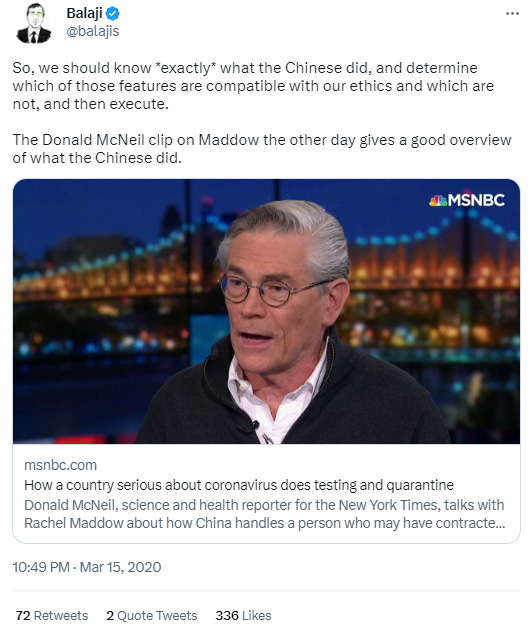

Balaji expressed great admiration for Bill Gates, second largest funder of the WHO, and on multiple occasions proposed the idea of making Bill Gates America’s “virus czar.” Gates was a vocal advocate for the global adoption of China’s lockdown policies throughout 2020 and 2021, and his broad influence pushed many institutions in a pro-lockdown direction.
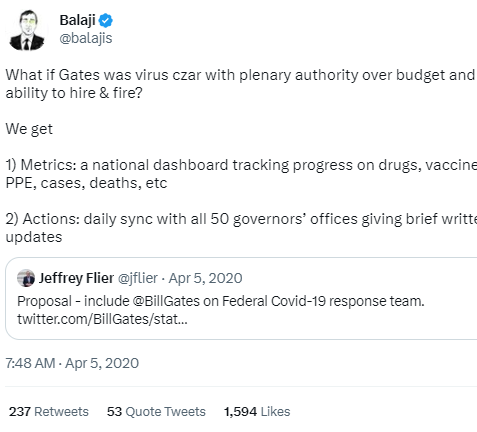



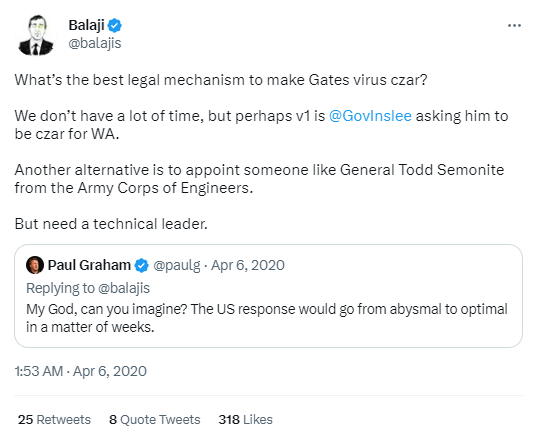

Gates later complained that “freedom” was hindering the Western response; China, by contrast, “did a very good job of suppressing the virus,” he said, thanks, in part, to the “typical, fairly authoritarian” approach and the “individual rights that were violated.”
On many occasions, Balaji stressed that leaders needed to be more afraid of the coronavirus, quoting WHO Director Tedros Adhanom: “All countries must use the window of opportunity created by the containment strategy to prepare for the virus’s possible arrival.”
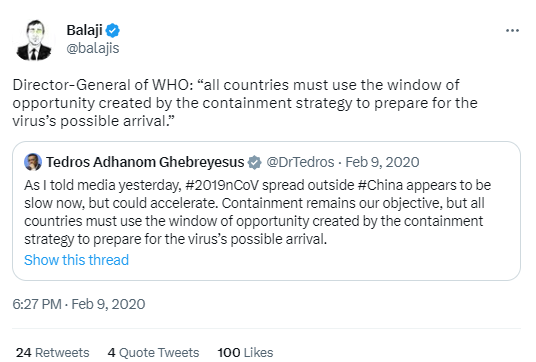

When a tech reporter wrote an article poking fun at Balaji’s tweets, he wrote a long, detailed thread in retort, citing many sources purporting to show why panic about COVID was justified—while also taking the opportunity to plug “tech the Chinese are using to fight virus.”
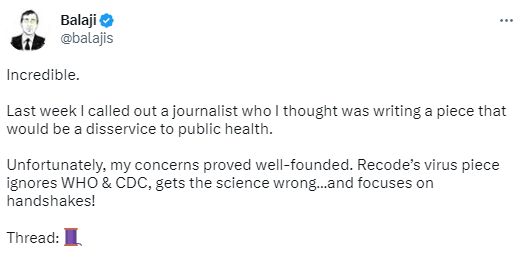

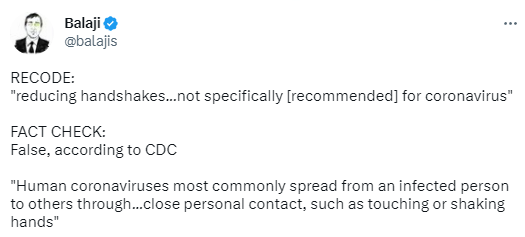

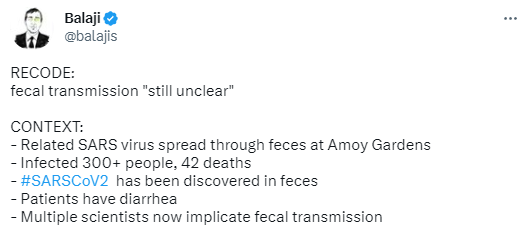

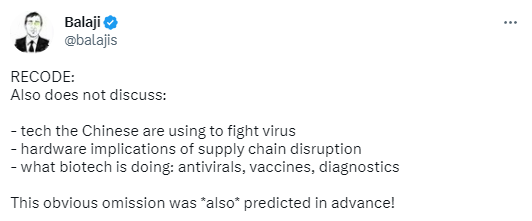

Yet by the end of spring 2020, Balaji appears to have lost interest in the subject and generally stopped tweeting about COVID with anywhere near the same frequency.
To recap, Balaji, a high-profile investor, began tweeting on January 30, 2020—three weeks before the modern Western world’s first-ever lockdown in Lombardy, Italy—and the same day an anonymous stock tip was posted saying:
There are very high profile investors who’ve been silently pulling out ahead of time… the WHO is already talking about how “problematic” modeling the Chinese response in Western countries is going to be, and the first country they want to try it out in is Italy. If it begins a large outbreak in a major Italian city they want to work through the Italian authorities and world health organizations to begin locking down Italian cities in a vain attempt to slow down the spread at least until they can develop and distribute vaccines, which btw is where you need to start investing.
Balaji was supposedly so scared of the new virus that, within days, he’d accurately predicted COVID would be deemed a global pandemic; the entire world would adopt China’s lockdown policy; everyone would soon wear a mask; work and everyday life would go remote; the world would “move away from handshakes, restaurants, and public gatherings;” governments would reduce the approval time for vaccines; it would take a year for a vaccine to arrive; and by that time the world would have shifted into a “new normal.”
Frankly, I don’t buy it. Balaji’s supposed fear of the coronavirus seems belied by the excitement he so frequently expressed about all the new technologies being unveiled in China which would soon see global adoption—and the investment opportunities that entailed—as well as the fact that he appears to have utterly lost interest in COVID after the strict lockdowns of spring 2020. Balaji’s elaborate Twitter threads in early 2020 took a lot of work, and there’s nothing about his background to suggest he’s that prescient or altruistic.
In my opinion, it’s far more likely that Balaji is exactly the kind of “high profile investor” described in the anonymous stock tip, who’d caught wind of the seismic plans being hatched by the WHO and their collaborators to recreate China’s COVID response across the world. He then may have decided to have a bit of fun playing Nostradamus.
Astonishingly, in March 2020, Balaji even referred to lockdown in the United States as a “bottom-up” policy—an argument utterly belied by the fact that he was one of only a few people in the world who’d publicly expressed anything close to a desire to emulate China’s lockdowns prior to the sudden lockdown imposed in Lombardy, Italy.
Unlike Tomás Pueyo, it’s unlikely that Balaji’s Twitter prophecies had a major effect on policy—though he did spread a bit of panic to bring these outcomes about. Rather, aside from the uncanny global coordination we observed in COVID policies and propaganda, Balaji’s tweets might be the best evidence so far that this plan to recreate China’s response did, in fact, exist, down to the particular terms and details of how the world would transform. There may be no question more important today than how the WHO and its collaborators were able to plan and execute something so cataclysmic, illiberal, and inhuman without any of our institutions stepping in or informing the public.
Republished from the author’s Substack
Join the conversation:


Published under a Creative Commons Attribution 4.0 International License
For reprints, please set the canonical link back to the original Brownstone Institute Article and Author.









